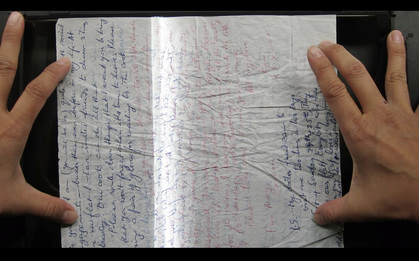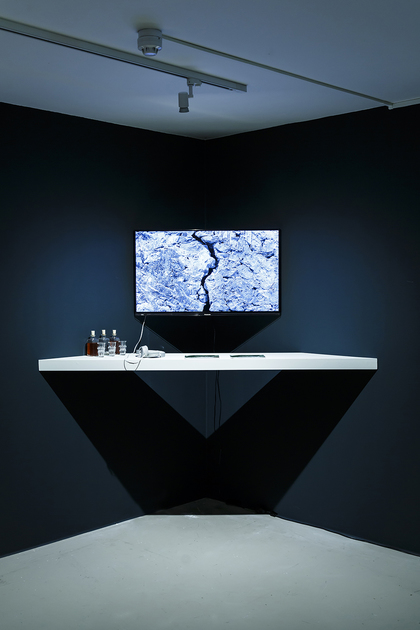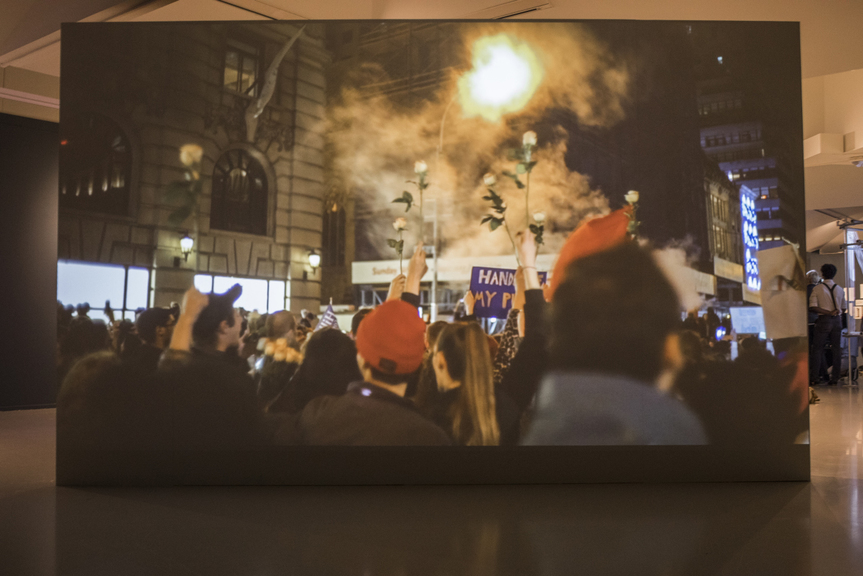-
From Current Issue
-
- Editor’s Letter Fire in the Heart
- Reviews I Gusti Ayu Kadek Murniasih
- Reviews 11th Seoul Mediacity Biennale: “One Escape at a Time”
- Dispatch Networked China
- One on One Monira Al Qadiri on Yukio Mishima
- Essays The rise of independent art spaces in pandemic-era Shanghai
- Features Tuan Andrew Nguyen
- Table of Contents
- Web Exclusives
- Archive
- Subscribe

R
E
V N
E
X
T
Installation view of “UnAuthorised Medium” at Framer Framed, Amsterdam, 2018. Photo by Eva Broekema. Courtesy Framer Framed.
Tucked away behind a bustling restaurant in the rapidly gentrifying neighborhood of Amsterdam-Noord, Framer Framed was an ideal space for the group show “UnAuthorised Medium.” The platform, dedicated to critical historiographies and the examination of intercultural processes in the arts, is a gem so well hidden it is only reachable if someone—such as a waiter, in my case—points you in the right direction. Similarly, the 12 Southeast Asian artists and collectives in “UnAuthorised Medium” asked visitors to look beyond the obvious. Through their multimedia works, the participants each interrogate the slippery nature of memories and the archive, rendering new accounts of the colonial past by folding in voices and perspectives that have been excluded.
Installation view of SIM CHI YIN‘s One Day We’ll Understand, 2018, photographic installation, dimensions variable, at “UnAuthorised Medium,” Framer Framed, Amsterdam, 2018. Photo by Eva Broekema. Courtesy Framer Framed and Sandra and Marlof Maks.
Artist and historian Sim Chi Yin’s installation One Day We’ll Understand (2018) examines a largely overlooked chapter of Cold War history through the lens of the life of her paternal grandfather, who was deported to China by the British during the anti-colonial insurgency in Malaya and eventually executed by anti-communist Kuomintang soldiers amid the Chinese Civil War in 1949. The work comprises five portraits, accompanied by photographs of objects from the civil war and texts, printed on non-archival paper with archival ink, such that the ink will remain legible but the paper will yellow with time. The transcripts and mail correspondences are based on Sim’s six years of research into her family’s oral accounts, and the 30 interviews she conducted with people who were part of the Malayan Emergency. Whether or not the accounts are factual remain unclear, however, reflecting the fragility and fallibility of memory and history.
Political and personal histories recorded in writing can also be seen in the video Scanning (2013) by Amy Lee Sanford. The work depicts the letters exchanged between the artist’s father, in Phnom Penh, and her adopted mother, in the United States, during the Cambodian Civil War, as each of the pieces of paper are scanned by a pair of hands in an unhurried, careful manner. The pivot between private and the political, and the blurred lines between fact and fiction are likewise part of Sung Tieu’s film No Gods, No Masters (2017). Domestic scenes like Sung’s family praying are backed by the haunting sound recording Ghost Tape Nr. 10, created as a psychological weapon by the US army during the Vietnamese war, when the sound was broadcast to frighten Vietcong soldiers.
With the heavy emphasis on textual histories and videos, there were a few works in the show that veered on being didactic. An example is the mixed-media installation by Tuan Mami, In a Breath – Nothing Stands Still (2018), which consists of a video, a homemade wine made from the bark of an almost extinct tree that visitors were invited to drink, and an instruction booklet detailing the impacts of mining on Vietnam’s ecosystems. The work calls on all five senses, and still I couldn’t shake the feeling that I was experiencing an illustration of a Wikipedia article on capitalism.
Other works utilized poetic license to greater effect. In the video Painting with History in a Room Filled with People with Funny Names 4 (2017), Korakrit Arunanondchai takes visitors on a mesmerizing, fantastical trip to his “memory palace.” His quest is intertwined with interviews investigating identity, technology, geopolitics, reality and fiction, with footage of safaris, paintings, dinosaurs and protests. For example, one of the scenes shows an old lady walking along the streets of Bangkok. She is then filmed in her house as she touches various household objects. In a soft French accent, she recites the names of the items that she still remembers, and talks about her dementia. “The present stopped existing for me. I might have forgotten the names of objects, but they still exist," she stated. In her navigation through the missing parts of her private archive and her attempt at finding the words that she lost, the woman embodied the key motivation behind the show—the dissection of how power has impacted the way we speak of history. After all, what’s the value of memory when you don’t have a voice? For a long time in Amsterdam, looking away from the country’s history of slavery and colonial profiteering has been the norm. “UnAuthorised Medium” took that preferred ignorance head on.
“UnAuthorised Medium” , curated by Annie Jael Kwan, is on view at Framer Framed, Amsterdam, until November 18, 2018.
To read more of ArtAsiaPacific’s articles, visit our Digital Library.
















